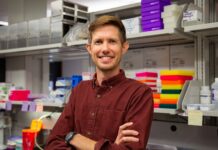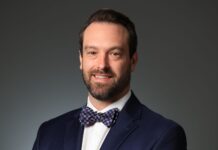LOUISVILLE, Ky. – One in eight women will be diagnosed with breast cancer. According to the U.S. Centers for Disease Control and Prevention, more than 200,000 women get breast cancer and more than 40,000 die from the disease each year in the United States.
October is Breast Cancer Awareness Month, and University of Louisville Physicians are available to discuss a wide range of topics relating to breast cancer. Breast cancer patients and one doctor also are sharing their personal stories of tragedy and triumph with the disease.
From the confusion many women feel over screening guidelines to a new treatment option for those who have been diagnosed, here are some suggested topics, though not an inclusive list:
Screenings: Clearing up the confusion – The sometimes conflicting information on breast cancer screening guidelines can be confusing for women. A recent Canadian study, which found mammograms may not save lives and earlier screening did not decrease the death rate, only added to the uncertainty. So, are mammograms beneficial in detecting cancer? Should you skip them? Who needs to be screened, and how often? And what about self-exams? Do they help? There’s also the issue of “over-diagnosis” when some suspicious lesions detected on a mammogram may not ever become cancer. Do women sometimes undergo unnecessary biopsies, surgery and radiation they don’t need? How is the need between taking action and saving a woman’s life, and avoiding unnecessary treatment and worry, balanced? Dr. Sara Petruska with UofL Physicians OB-GYN & Women’s Health, Dr. Diane Harper with Family Medicine and Dr. Nicolas Ajkay, a breast surgical oncologist, can help clear up the confusion, and talk about controllable and uncontrollable risks for breast cancer to help women make informed decisions.
To arrange for an interview with Dr. Petruska, Dr. Harper or Dr. Ajkay, contact Tiffany Meredith, tiffany.meredith@ulp.org, 502-588-0337
Abnormal mammograms: What do they mean? – The results of your mammogram were abnormal. What does this mean? Should you be worried? What are the next steps, and what can you expect? Dr. Sharmila Makhija, chair of the UofL Department of Obstetrics, Gynecology and Women’s Health, has answers.
To arrange for an interview with Dr. Makhija, contact Tiffany Meredith, tiffany.meredith@ulp.org, 502-588-0337 or Jill Scoggins, jill.scoggins@louisville.edu, 502-852-7461
Genetic testing: BRCA and the “Jolie effect” – Should all women get genetic testing to determine their risk for breast cancer? After actress Angelina Jolie learned she carried the BRCA genetic mutation that puts a woman at higher risk for breast and/or ovarian cancer, she underwent a preventive double mastectomy. Jolie encouraged women to get tested, and last month, the geneticist that identified the first genetic mutation suggested all women be offered testing for BRCA variants beginning around age 30. But the U.S. Preventive Services Task Force has cautioned against unnecessary testing, saying intensive screening for breast cancer is associated with false positives, unnecessary imaging and unneeded surgery. Dr. Nicolas Ajkay, a breast surgical oncologist with UofL Physicians, can talk about who should undergo genetic counseling.
To arrange for an interview with Dr. Ajkay, contact Tiffany Meredith, tiffany.meredith@ulp.org, 502-588-0337
Breast reconstruction and options – After being diagnosed with breast cancer, the reconstruction part of the cancer journey is often where women look for more information and guidance. Dr. Bradon Wilhelmi, the Leonard Weiner Endowed Professor and Chief of Plastic Surgery at UofL, stays at the forefront of breast cancer care and treatment and regularly lectures and publishes scientific articles about research and best options for reconstructive surgery. Patient Jessica Rizzo says “The work Dr. Wilhelmi does instills confidence in his patients and helps them regain a feeling of womanhood and familiarity in their lives. The hardest part of having cancer is looking in the mirror and not recognizing the person staring back at you. When you lose your breasts, an overwhelming sense of loss and insecurity takes over. … The miracle he provides is unmatched and priceless.” Dr. Wilhelmi can talk about breast reconstruction and options for women.
To arrange for an interview with Dr. Wilhelmi, contact Tiffany Meredith, tiffany.meredith@ulp.org, 502-588-0337 or Jill Scoggins, jill.scoggins@louisville.edu, 502-852-7461
New radiation regimen gives women more choice – An experimental regimen of once-weekly breast irradiation following lumpectomy provides more convenience to patients at a lower cost, results in better completion rates of prescribed radiation treatment, and produces cosmetic outcomes comparable to the current standard of daily radiation. Headed by Dr. Anthony Dragun, radiation oncologist with University of Louisville Physicians, the clinical trial is currently enrolling patients who choose to have once-weekly radiation treatments instead of the current standard of daily treatments. “Instead of daily treatments for 25-30 days, five to six treatments are administered once each week,” he said. “I thought this regimen would give our patients a great deal of access and choice.” Patients undergoing a lumpectomy following diagnosis of breast cancer are given a choice of the current standard of daily radiation treatments or the option to enroll in the trial and receive treatment one time per week. “The outcomes with once-weekly treatments are absolutely in line with what we see in daily breast irradiation,” he said. “The standard of care is maintained. We believe the once-weekly regimen will become a standard option in the next decade.” UofL’s James Graham Brown Cancer Center, part of KentuckyOne Health, is the only site in the United States offering the experimental regimen although a second site in Kentucky is being planned. For information on how to enroll in the trial, contact 502-562-4360.
To arrange for an interview with Dr. Dragun, contact Jill Scoggins, jill.scoggins@louisville.edu, 502-852-7461
Mobile Mammography Van makes getting screened convenient – One in eight women will be diagnosed with breast cancer in their lifetimes, but with early detection, the five-year survival rate is more than 80 percent. Mammograms are an important tool in early detection. For more than 20 years, the James Graham Brown Cancer Center’s Mobile Mammography Unit has provided mammograms to women in their community, church, school or place of business. “Annual mammograms can be the difference between life and death,” said Dr. Dharamvir Jain of University of Louisville Physicians Medical Oncology and the James Graham Brown Cancer Center, part of KentuckyOne Health. “Our Mobile Mammography Unit has the same technology that a doctor’s office does, but we make the screening as easy and fast as possible for women in our community.” Early detection by mammograms leads to a greater range in treatment options, including less-extensive surgery and the use of chemotherapy with fewer side effects. To find out more about scheduled stops for the Mobile Mammography Unit, visit kentuckyonehealth.org/mobilescreenings.
For an interview with Dr. Jain, contact Jill Scoggins, jill.scoggins@louisville.edu, 502-852-7461

























